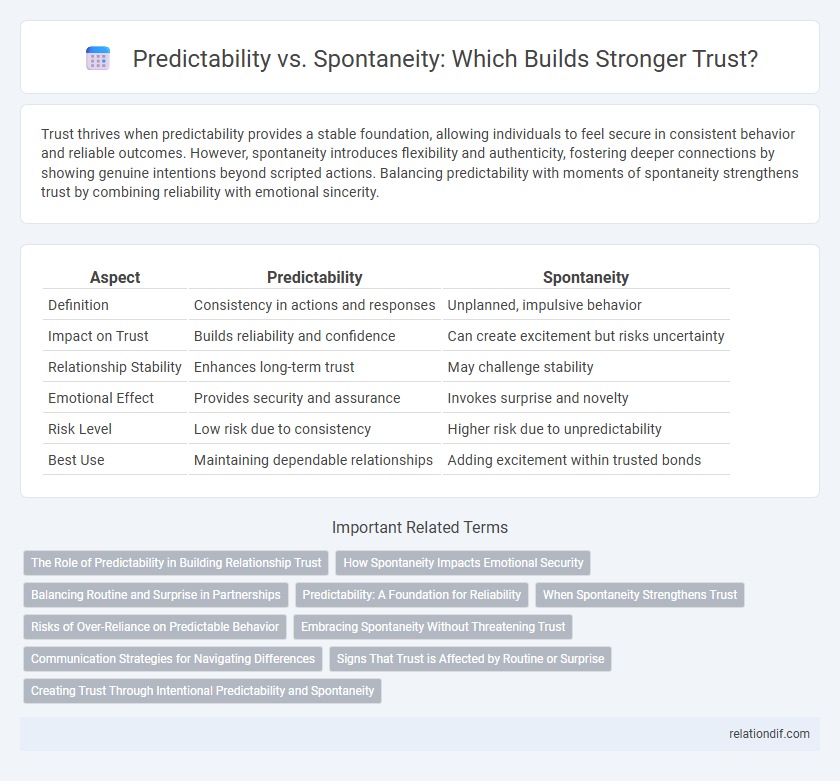Trust thrives when predictability provides a stable foundation, allowing individuals to feel secure in consistent behavior and reliable outcomes. However, spontaneity introduces flexibility and authenticity, fostering deeper connections by showing genuine intentions beyond scripted actions. Balancing predictability with moments of spontaneity strengthens trust by combining reliability with emotional sincerity.
Table of Comparison
| Aspect | Predictability | Spontaneity |
|---|---|---|
| Definition | Consistency in actions and responses | Unplanned, impulsive behavior |
| Impact on Trust | Builds reliability and confidence | Can create excitement but risks uncertainty |
| Relationship Stability | Enhances long-term trust | May challenge stability |
| Emotional Effect | Provides security and assurance | Invokes surprise and novelty |
| Risk Level | Low risk due to consistency | Higher risk due to unpredictability |
| Best Use | Maintaining dependable relationships | Adding excitement within trusted bonds |
The Role of Predictability in Building Relationship Trust
Predictability plays a crucial role in building relationship trust by fostering reliability and consistency in behavior, which helps individuals feel secure and understood. When actions and responses are foreseeable, trust strengthens as expectations align with experiences, reducing uncertainty and anxiety. This stable foundation enables deeper emotional connections and effective communication between parties.
How Spontaneity Impacts Emotional Security
Spontaneity in trust fosters emotional security by encouraging authenticity and reducing rigid expectations, which allows relationships to grow through genuine interactions. Unpredictable acts of kindness or support signal deep empathy and commitment, reinforcing the emotional bond. This dynamic creates a safe space where individuals feel valued for their true selves, strengthening mutual trust.
Balancing Routine and Surprise in Partnerships
Balancing predictability and spontaneity in partnerships strengthens trust by blending routine actions with unexpected gestures that reinforce reliability and emotional connection. Consistent behaviors build a foundation of dependability, while occasional surprises prevent stagnation and foster excitement, deepening mutual commitment. This dynamic interplay ensures partners feel secure yet engaged, maintaining a healthy and resilient relationship.
Predictability: A Foundation for Reliability
Predictability serves as the cornerstone of trust by providing consistent and reliable behavior that others can depend on. When actions and responses align with established patterns, it reduces uncertainty and reinforces confidence in relationships. This stability fosters a sense of security, making predictability essential for building and maintaining lasting trust.
When Spontaneity Strengthens Trust
Spontaneity strengthens trust by demonstrating authenticity and genuine intentions through unexpected acts of kindness or honesty, which reinforce emotional bonds. Unpredictable yet positive behaviors signal reliability in dynamic contexts, enhancing confidence in the relationship's resilience. This balance between predictability and spontaneous moments fosters deeper trust by showing adaptability without sacrificing integrity.
Risks of Over-Reliance on Predictable Behavior
Over-reliance on predictable behavior in trust can lead to vulnerability as it limits adaptability in dynamic situations, increasing the risk of exploitation by unforeseen challenges. Trust built solely on routine actions may erode when unexpected circumstances arise, weakening relational resilience. Balancing predictability with spontaneity fosters a more robust trust that accommodates change and uncertainty effectively.
Embracing Spontaneity Without Threatening Trust
Spontaneity enhances trust by fostering authenticity and emotional connection, allowing relationships to thrive beyond rigid routines. Embracing unpredictability with clear communication ensures that spontaneity does not undermine the reliability foundational to trust. Balancing consistent behavior with genuine surprises strengthens relational bonds and promotes mutual confidence.
Communication Strategies for Navigating Differences
Effective communication strategies for navigating differences between predictability and spontaneity in trust involve clearly expressing expectations while remaining open to flexibility. Establishing transparent dialogue channels ensures that both structured plans and unplanned moments are respected, fostering mutual understanding. Prioritizing active listening and empathetic feedback helps bridge gaps, reinforcing trust in diverse interaction styles.
Signs That Trust is Affected by Routine or Surprise
Trust is influenced by predictability when consistent behavior establishes reliability, yet excessive routine can lead to boredom and doubt. Sudden surprises or deviations might trigger uncertainty, signaling shaken trust if reactions are negative or defensive. Observable signs include hesitation in communication, reduced openness, and a shift from collaborative to cautious interactions.
Creating Trust Through Intentional Predictability and Spontaneity
Creating trust involves balancing intentional predictability and spontaneity to foster reliability while maintaining engagement. Consistent actions signal dependability, forming a foundation of trust, while spontaneous gestures demonstrate authenticity and adaptability. This dynamic interplay enhances relational depth, encouraging openness and confidence between parties.
Predictability vs Spontaneity in Trust Infographic

 relationdif.com
relationdif.com